Cinema-Scene.com
Volume 3, Number 30
This Week's Reviews: Planet of the Apes, Tokyo Story,
The Road Home, Startup.com, Under the Sand.
This Week's Omissions: NONE.
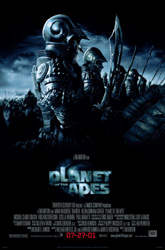 |
Planet of the Apes 
(Dir: Tim Burton, Starring Mark Wahlberg, Helena
Bonham Carter, Tim Roth, Michael Clarke Duncan, Estella Warren, Paul Giamatti,
Cary-Hiroyuki Tagawa, Erick Avari, Luke Eberl, Evan Dexter Parke, Freda Foh Shen, Kris
Kristofferson, David Warner, Glenn Shadix, Lisa Marie, and Charlton Heston)
more
BY: DAVID PERRY |
"I confess freely to you, I could never look long upon
a monkey, without very mortifying reflections."
Like English playwright William Congreve said in a letter,
French novelist Pierre Boulle had his own feelings on mirroring present day life with the
evolutionary simians. However, Boulle took on the idea in a different fashion: he wrote a
book about it. In his 1963 novel La Planète des Singes, Boulle created an
indictment of the things that bothered him in this world -- religion, science,
scholarship, and government. Boulle lead a highly cynical life -- a year of which was
spent in a Malaysian prisoner of war camp that would later serve as the setting for his
masterpiece, The Bridge Over the River Kwai -- and his disposition with life at
that time was transcribed into his metaphorical sci-fi novel.
Of course, that novel was made into a highly successful
1968 film called Planet of the Apes by screenwriters Michael Wilson and Rod
Serling and director Franklin J. Schaffner and Boulle's story would live on, much to his
chagrin, in the form of four sequels (and, technically, prequels). Now, 38 years since the
novel's publication, screenwriters William Broyles, Jr., Lawrence Konner, and Mark
Rosenthal and director Tim Burton revisit Boulle's novel, tinker with a few things and
make their own adaptation -- a new Planet of the Apes for a younger generation.
Yet, here's the rub, the original 1968 film has become a
B-movie classic over the years. The younger generations, though uninterested in the works
of Lean, Hawks, and Wilder, have grown an appreciation for the Schaffner film. Where
Generation X may scoff at Fantastic Planet, The Day the Earth Stood Still,
and Journey to the Center of the Earth, they can value Planet of the Apes. Beyond
the now dated production values, they get a kick out of a film so happy to denounce the
establishment and include a shock ending.
So that raises the very understandable question, why even
make another Planet of the Apes film? I remember someone once asking the question
as to why producers remake good films, why not remake films that are hurt by one or two
miscalculations -- movies that only need something extra to stand as great pieces of
cinema? Planet of the Apes is already part of the cinematic history, reworking it
is not going to bring up its status.
All these were problems that plagued me before even seeing
Tom Burton's try at Boulle -- little did I know that his film would actually be a mind
numbing experience that can stand on the same level as his worst film, the 1995
monstrosity Mars Attacks! Burton is one director that can work well with a dark,
moody film. His oeuvre includes such greats as Beetlejuice, Batman, Edward
Scissorhands, Sleepy Hollow, and Ed Wood -- the only two previous
times in which he did not film a movie with the darkest cinematography imaginable were Mars
Attacks! and Pee-wee's Big Adventure, long considered his least two films.
Planet of the Apes does not become Burton -- his
directorial graces do not do many favors to the highly flawed screenplay delivered by the
screenwriters. This is the type of film that would have probably settled much better with
a director more in tap with adventure films, at least ones that are not disturbingly
heavy. A name like James Cameron or Ridley Scott or Wolfgang Petersen could have pulled
off a better visualization of Boulle's novel -- at least then the reworking might not have
seemed like such a creation of disrepute.
For this version, Mark Wahlberg takes on the role long
regarded to be the sole creation of Charlton Heston, an American astronaut who crash lands
on a planet where apes are the dominant species and men are treated like primitive beasts.
Boulle's creation, Ulysse Merou was given the anglicized name of George Taylor and has now
been given the moniker Leo Davidson -- standing as one of the film's many name changes.
After a stupid attempt to save his beloved trained monkey, the US air force officer finds
himself sent into the future, where he lands on this planet of intelligent and rather
belligerant apes. The original film's comparison of an intelligent yet warring human race
and an intelligent and peaceful simian race is lost on this film as the apes are just as
guilty of mistreatment of armaments as the humans of the past are.
Davidson is thought to be merely another primitive human
walking around the planet, but upon further examination, a statesman's daughter named Ari
(Carter) becomes sympathetical of the treatment of humans by her kinsmen. Soon she has
even helped Davidson in getting away from the extremely aggressive General Thade (Roth),
the over-the-top, non-philosophical, and near heathen-like re-envisioning of the
original's Dr. Zaius. All he wants to do is somehow get away from this planet, but soon he
finds that the humans (who can talk in this) identify him as being their only hope at
salvation from the apes.
Mark Wahlberg has done some really tough work over the last
five years to convince people that he is no longer part of the Funky Bunch, but watching
him tread on territory that I automatically connect to Charlton Heston can only leave me
watching Marky Mark on the screen. He lacks the dramatic stylings of everyone's favorite
extremist actor; instead he is left to make musings about this world he cannot comprehend.
Poor a performance as it may be, Wahlberg is definitely an example of Generation X-minded
casting involved on the picture (which also so goes into the casting of the incredibly
plain Estella Warren taking over the original's Nova character).
The film's two finest actors, Carter and Roth, get to have
some fun in their monkey suits. However, they just do not come to life in there like Kim
Hunter, Roddy MacDowell, and Maurice Evans did in 1968. By the end of the film, it is
completely incomprehensible what caused the normally terrific Roth to take a role that is
nothing more than him growling and jumping around. Carter, by the end, looks better than
her costar, yet it is hard to imagine an actress of her stature -- one who can stand out
in both art house dramas (The Wings of the Dove) and contemporary creations (Fight
Club) -- feeling that this role would give her a chance to show off her fine
dramatics.
It is easy to criticize Burton's Planet of the Apes
by comparing it to the original, but the underlying truth is that it fails regardless of
having a fine precursor. He may have given the film a more aggressive feel, reinstated
some Boulle touches (including a rework of the novel's poor ending), and livened up the
action, but in the end his vision of this novel is nothing more than another mistake in
the Planet of the Apes collection. Though not as bad as some of the original's
sequels, including Beneath the Planet of the Apes, Conquest of the Planet of
the Apes, and Battle for the Planet of the Apes, Burton's film is a poor
cousin to those poor moments. It's the misbegotten child of Franklin Schaffner's film, a
few steps back on the evolutionary chart.

BUY THIS FILM'S
  
FROM AMAZON.COM |
REVIEWS OF THIS FILM
   |
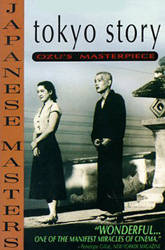 |
Tokyo Story

(Dir: Yasujiro Ozu, Starring Chishu Ryu, Chieko
Higashiyama, Setsuko Hara, Haruko Sugimura, Kyôko Kagawa, Setsuko Hara, Kuniko Miyake,
Zen Murase, Teruko Nagaoka, Nobuo Nakamura, Hisao Toake, Eijirô Tono, Shirô Osaka, and
Mitsuhiro Mori)
more
BY: DAVID PERRY |
Yasujiro Ozu became the icon of the Japanese dramatic film
experience after the long awaited release of his films in America. The best regarded of
his films is Tokyo Story, which was made in 1953 but did not receive an American
release until 1964 -- and the film theorists would never look at the Sino-cinematic world
the same. What was once a land in the East only known for Kurosawa films would forever
have a second bright shining director to establish a name for the style found there. The
Asian historical action films will forever be referred to as Kurosawa-like; the deep,
lethargic movies that are distant yet tell so mach are Ozu-like.
Ozu's film is a meditation on what it is like to reach that
introspective point in life where you can look at your adult children in either adulation
or disdain. Even more so, though, Tokyo Story takes a sharp look at the way
children outgrow their parents. Using the word 'meditation' is perfect when writing of an
Ozu film, the sturdy and slow way the director films is a testament to his abilities:
where some directors would have created an overlong bore, Ozu creates something even more
enthralling.
The elderly Hirayama's, Shukishi (Ryu) and Tomi
(Higashiyama), make the decision to finally leave their home in the small village of
Onomichi and visit their children who are mainly settled in parts of Tokyo on a 10 day
holiday. The two that they consider to be successes before leaving is one son, a smalltime
doctor, and one daughter, a self-reliant hairdresser. But they can only feel disparage for
their children after a night there -- the Hirayama's are hurt to see that not only are
their children not as successful as was thought, but also that they seem to have little
time of care for seeing their parents. Before long they have been shuffled off to a spa in
Atami -- the kids think that this is a nice place where their parents will get some rest
and be out of their hands.
But the place is crowded and the couple decide to return to
Tokyo a day early only to find that there is no longer any room for them in the houses
they expected to stand open for them. However, as disgraceful as the two blood relatives
may be, the Hirayama's find that they are truly welcomed by their daughter-in-law Shige
(Sugimura) who is now a widow. Since they have no real place to stay, Tomi is invited into
Shige's apartment -- this relative-by-marriage is also the only person who took off work
to show them around Tokyo upon their arrival -- and Shukishi decides to spend an evening
drinking with some old friends and mull over the disappointment he has seen on this small
trip. After visiting their other son in Osaka, the Hirayama's return home to their
youngest daughter who still lives with them in Onomichi. But a change of plans soon brings
the family back together and all their problems, fears, desires, and distastes come up as
they sit at a rather sad family reunion.
Ozu uses his camera as an innocent bystander, a third
person caught amidst all the people trying to understand each other. While this gives the
film a distant feel -- the camera only moves once in the entire film, and in that case it
is only to show the couple standing alone at the otherwise crowded spa -- it also makes it
ever so intimate. Ozu's characters live and breathe through his direction and their
actions seem more personal and worrisome than would have otherwise been seen. When the
camera does go in for the occasional close-up, the shot is more important as a chance to
show an emotion than to give a break from the long shots. Nevertheless, because of this
longer span from afar, these up close and personal shots seem more determined to strike
the needed chord because they are such a break in the editing.
The movie is paced rather slowly and clocks in at a
surprising 139 minutes, yet each moment, each passing glance seems important in the film.
No matter what the running time is, Ozu has captured a film so remarkable that each frame
seems tantamount to the story in some way, whether it be for pacing, continuity, or mood.
Ozu sets his sights on just the right parts of a realistic storytelling structure and
makes the most out of it. Generations of Japanese filmmakers have learned from Ozu -- even
Kurosawa became a bit of a devotee into his elder years -- and his touch is seen on
countless movies these days. The last film to successfully capture the spirit of Yasujiro
Ozu was Edward Yang's Yi Yi (A One and a Two...), unquestionably one of the
finest films to come from Asia in years. I remember the pure emotion that I felt when I
finished Yang's film, a feeling that is also found in Ozu's films.
Finishing Tokyo Story is like finishing a deep
allegorical poem -- its lyricism fills the air with a stunning realization of everything
that it aspires to be. When the final title card comes up to tell the audience that the
film has come to an end, it is hard to imagine a world without the magic that just
transpired on the screen in front of them.

BUY THIS FILM'S
  
FROM AMAZON.COM |
REVIEWS OF THIS FILM
   |
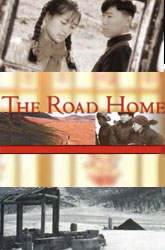 |
The Road Home 
(Dir: Zhang Yimou, Starring Zhang Ziyi, Zheng Hao,
Sun Honglei, Zhao Yuelin, Li Bin, Chang Guifa, Sung Wencheng, Liu Qi, Ji Bo, and Zhang
Zhongxi)
more
BY: DAVID PERRY |
A young man, Yusheng Luo (Honglei) enters the small North
China village of Sanheutun, where it is in the middle of a stark winter. This is the town
that he grew up in; he has now made a rather successful life as a businessman in the
nearby large city. He has returned to help bury his father, the town's long-standing
teacher. His main interest is towards his grieving mother, but he soon learns the whole
town is also in great grief over the loss -- a new teacher has been called for, but his
arrival is sure to be something that cannot replace the man that has taught nearly every
adult in the village.
That is the frame story that Zhang Yimou starts The
Road Home with, a touching yet forgettable tale of true love. This story frames the
actual tale to be told, the story of Yusheng's mother and father beginning their
relationship. This is a tale of two people marrying because they are in love, not because
that was their parents' arrangements. These are two people in 1958 China that allow their
emotions to move them, which also means that they must deal with the fear and shyness that
comes with attraction.
In this extended flashback, narrated by Yusheng, we are
introduced to young Di Zhao (Ziyi), who is considered to be the prettiest maiden in the
village. Because of the custom, she is chosen to weave the bright red cloth that will hang
from the village's newest building, a one-room school. She is 18, one of the few girls of
her age in the entire town; for this reason, she spends the entire day working in the home
with her blind mother. When the young, handsome teacher, 20-year-old Changyu Luo (Hao),
finally rides into town, Di is immediately attracted. However, he does not notice the girl
that is constantly shadowing him until nearly a month after his arrival. Even her
well-placed food dishes at the building site for the school fail to get his attention.
But finally she gets his eyes and his heart, but, as all
love stories must have, there is a situation to pull them apart. Political problems that
marred China in the 1950's are still enough to make their ways into this small town, where
the teacher is even held under the Mao influence. Though never really mentioned, the only
notice of Mao in the entire film is a portrait that hangs over the chalkboard in the
school -- otherwise all the upheaval is implied.
There is something important to the way that Yimou films
his little drama. Using beautiful shots that convey the atmosphere and a liberal dosage of
close-ups of his beautiful young actress, Yimou allows the movie to remain something of a
constant eye-candy, at least one for the art house crowd. The consistency of the intrigue
is rather sketchy and the personifications are not quite all they could be, but Yimou does
not simply let the movie fall to the wayside even though his story, written by novelist
Bao Shi does.
The directorial prowess that Zhang Yimou consistently shows
is one of great restraint. One of the few things that I noted as I watched the film was
the way that he balanced his liberal artistry with a highly conservative use of his
politics. Yimou has become rather known for his politicking in film, but this is an
anomaly in the filmography, it is a chance for him to show that he can make a regular film
just as well as he can make an editorial-driven film. His last work was Not One Less,
which failed because of an overbearing pervading political stance. By the last frame of
that film, I was desperately ready for it to come to an end; by the end of The Road
Home, I was happy that it had remained rather unsullied by any agenda.
Zhang Ziyi made this as her first film and delivers the
type of fine performance that you would expect from the young Crouching Tiger, Hidden
Dragon actress. She is not only an image of beauty, but also an actress of great
skill. She is the main vantage point of the film and her performance is near the radiance
of the one she gave in Crouching Tiger. Looking at her current production slate,
the promise that Ziyi showed has caused a nice list of directors lusting over working with
her in the future. Besides the upcoming Rush Hour 2, Ziyi is currently set to
appear in Tsui Hark's The Legend of Zu and Wong Kar-Wai's 2046. By her
25th birthday, Zhang Ziyi will have worked with such Asian masters as Tsui Hark, Wong
Kar-Wai, Ang Lee, and Zhang Yimou -- she's like an Eastern incarnation of Jodie Foster.
The Road Home is not a perfect film, but it
certainly has much to offer beyond a fine director and star. By the end of her career --
hopefully many decades from now -- The Road Home might still be considered a
memorable film in her filmography. And if it's still the least impressive movie in the
oeuvre, then that's one mighty impressive career.

BUY THIS FILM'S
  
FROM AMAZON.COM |
REVIEWS OF THIS FILM
   |
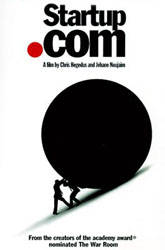 |
Startup.com

(Dir: Chris Hegedus and Jehane Noujaim,
Appearances by Kaleil Isaza Tuzman, Tom Herman, Maynard Jackson, and Bill Clinton)
more
BY: DAVID PERRY |
In February of 1998, I began my tenure on the internet with
the first release of the reviews for Cruel Intentions and The 24-Hour Woman.
That was the modest beginning of what is now Cinema-Scene.com, the site that you are
either reading this review from or where it first originated. Over three years later, the
site is still maintained by two people -- a webmaster and a writer. That's it; these two
minds -- Eric Winchell's and mine -- are the only ones that have worked on anything
involving the site. At no time have we taken submissions from others, contracted
businesses to create images, or let another head come into the creation of a single facet
of the site.
We, like the men behind govWorks.com, had the same idea of
developing something on the web that might help people. The difference is that our idea,
to give people informed essays on films, and their idea, to help people get rid of the red
tape in municipal payments, vary on their importance. I like to think that convincing a
person to see Amores Perros instead of The Mummy Returns is a great
accomplishment, but, I digress, it's hard to compare that to letting people pay a parking
ticket online.
Yet I felt some sort of kindred connection with Tom Herman,
the young, bright-eyed web developer who helps create the foundation of govWorks.com. He
went into the business to help people, not necessarily for the money. Things change, of
course, and by the film's midpoint, when Tom is worth around $12 million, it is easy to
see that he no longer only considers the ideals to be the importance of govWorks.com.
Tom's partner in all this is Kaleil Isaza Tuzman, the
co-founder and, finally, the CEO of govWorks. Kaleil left his seemingly lucrative job at
Goldman Sachs to start this venture with two of his friends. Immediately, it becomes
rather easy to see that Kaleil is taken aback by the early success of govWorks -- when
they pick up a consultant in former Atlanta mayor Maynard Jackson, whose only real
importance is to give them a nice little mantra, and finally have to drop the third
founding father, it is easy to see that the job has gone to Kaleil's head. At Goldman
Sachs, he was just another fly on the wall; at govWorks.com, he is the big shot with his
face plastered on magazines and television screens.
There was a time when the short-lived TV channel ZDtv had a
thirty-minute news program that documented the rise and fall of particular dot-coms as
they came and went. I saw many of these names flash by, with only sites to look at, not
the people behind them. With Startup.com, the audience is allowed to see the
people that were ruined by the dot-com shakedown late last year. By the time govWorks.com
was finally forced out of Kaleil's hands in January this year, hundreds of equally
ambitious projects had seen their own demise. Meanwhile, thousands of people have lost
their jobs and, in some cases, millions of dollars.
Startup.com has the added intimacy lent by
co-director Jehane Noujaim, who was Kaleil's roommate in Harvard. She has the ability to
get her camera into the meetings and fights that ensue. Beginning with Kaliel's decision
to let her film their early work in May of 1999, Noujaim was able to get the interest of
Chris Hegedus and D.A. Pennebaker, the two directors behind the incredible 1993
documentary The War Room. Hegedus joined Noujaim to direct the feature and
Pennebaker brought in backers to help finance the film. The final product is one of the
finest documentaries to cover the technological side of success and failure.
With this film, the audience gets a chance to see a
business go from a modest three minds to a 200 worker business and finally to a "Six
Months Later" card that can only mean bad things. By the time Noujaim and Hegedus
take this jump forward, an important part of the team behind govWorks.com has been put on
the line and the site is already looking troubled from both competitors and technological
glitches. The breakdown that occurs at this juncture in the web development is perhaps the
most damning. If a site's success can do this, one can only wonder how much worse it could
get for these two twenty-something millionaires. As Nietzche said: "Success has
always been the worst of liars."

BUY THIS FILM'S
  
FROM AMAZON.COM |
REVIEWS OF THIS FILM
   |
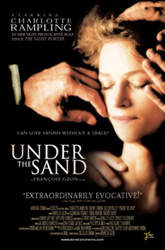 |
Under the Sand 
(Dir: François Ozon, Starring Charlotte Rampling,
Bruno Cremer, Jacques Nolot, Alexandra Stewart, Pierre Vernier, Andrée Tainsy, and David
Portugais)
more
BY: DAVID PERRY |
Death is one of those absolutes in life -- sooner or later
it happens to everyone. Most people spent their entire lives wondering when they'll
shuffle off this mortal coil, however that is not the way that everyone does. Take for
example the married couples that feel completely dependent on the others, how does a
codependent widow or widower mourn? Under the Sand tries to answer that question, creating
one of the finest films this year.
François Ozon's elegiac masterpiece looks at one woman and
the torture that ensues when her husband disappears. The mourning that she goes through is
something of poetry -- Under the Sand stands as one of the few films of recent
years to take the sensibilities of late 19th century French poetry and turns it into
something decidedly cinematic. Ozon's quiet and without a doubt French film comes off as a
bittersweet work of genius, a look at bereavement so alarmingly beautiful that it must be
heralded.
The film begins with a long married French couple, Jean
(Cremer) and Marie Drillon (Rampling), making their yearly holiday to their tiny seaside
estate in the southwest. Things are definitely old-shoe for these two -- they go through
the regular actions of their arrival while speaking little. Yet it is easy to tell that
the two are close, though not necessarily carrying their affection on their shoulders.
Jean seems as vital to the life of Marie as she does to his life.
But all this is changed on the second day when they decide
to visit the rarely used side of the beach. Marie sunbathes, reads a little, and takes a
nap while Jean takes a swim in the ocean. When Marie awakes she is unable to find her
husband anywhere. Hurriedly calling for help from the lifeguards a few beaches away, a
large search over the ocean begins to no avail. Questions plague the scene: was it an
accidental death or a suicide? Is Jean even dead, deciding to walk away from his life with
Marie?
Marie returns to Paris and takes goes back to life as if
nothing has happened. Through her home, her work (as a college English professor), and her
social life, things seem normal. Her friends are a little worried about her grieving
considering that she talks to them as if Jean is still around -- based upon a dinner party
conversation, a bystander would never think that Marie is without a spouse. But the real
frightening part of her psychological mourning is that she literally lives her home life
as if Jean is still there. In Marie's mind, Jean stays at home and waits for her every day
-- his disappearances means nothing because the image of him in their home lives on.
Things continue in their relationship and she even takes an
unusual turn: the always-dreaded affair. Everyone else seems determined to get her to date
publisher Vincent (Nolot) and finally she breaks down and begins a relationship. Through
the acts of self-alleged adultery, Marie feels the guilt of seeing a man other than the
husband she truly loves. She has so successfully convinced herself that Jean is still
around that she is somewhat hurt breaking their bond.
It has been 14 years since Charlotte Rampling's strong
double feature in Angle Heart and Mascara and time has not been kind to
her career. But with Under the Sea, Rampling delivers her best performance yet.
It is a subtle, strong work memorable of the second-bill roles that marked her for years
including Stardust Memories, The Verdict, and her prior best work Farewell,
My Lovely. Rampling is still the beautiful actress that we saw in those films, but
over the years she has heightened her acting ability, bringing them to a peak here. Every
once and a while foreign actresses force their way into the Best Actress race at the
Academy Awards, if that should happen this year -- and I would be ecstatic if it did
considering the strong list of foreign females thus far in 2001 -- I dearly hope that
Rampling will be the one to fill that spot. Then, perhaps, a second spot can open for Faithless'
Lena Endre.
François Ozon has slowly made a name for himself over the
last couple years. In the last four years, he has presented some of the most interesting
imports to travel across the Atlantic. See the Sea, Sitcom, Water
Drops on Burning Rocks, and Under the Skin present a mighty impressive
filmography -- and that only covers the one's I've seen, he's made 18 in all. Under
the Skin stands as his best work, though comparing it to the equally moody and
entrancing See the Sea is quite a task. Ozon has perfectly documented one woman's
form of grieving and made it into one of the best little dramas to play on these shores
this year.

BUY THIS FILM'S
  
FROM AMAZON.COM |
REVIEWS OF THIS FILM
   |
Reviews by:
David Perry
©2001, Cinema-Scene.com
http://www.cinema-scene.com









